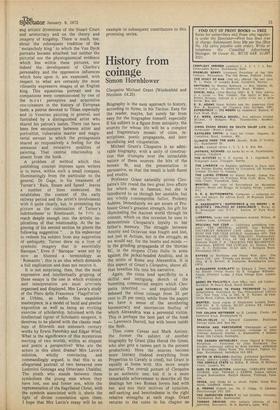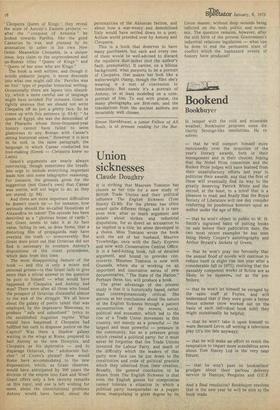History from coinage
Simon Hornblower
Cleopatra Michael Grant (Weidenfeld and Nicolson £4.25) Biography is the easy approach to history, according to Syme, in his Tacitus. Easy for the reader, maybe, but surely far from easy for the biographer himself; especially If his subject is a figure from antiquity, the sources for whose life will be a complex and fragmentary mosaic of coins, inscriptions, poetic propaganda, and later moralising and vituperation.
Michael Grant's Cleopatra is an admirable biography, with a unity of construction that triumphs over the intractable nature of these sources: the bits of the mosaic fit, and the presentation is persuasive, so that the result is both fluent and erudite.
Professor Grant naturally pivots Cleopatra's life round the two great love affairs for which she is famous; but she is introduced to us through her unstable, but not wholly contemptible fat'Aer, Ptolemy Auletes. Immediately we are aware of Professor Grant's greatest strength, his gift for illuminating the Ancient world through its coinage, which on this occasion he uses to demonstrate Cleopatra's loyalty to her father's memory. The struggle between Antony and Octavian was fought and lost, not just at Actium, but in the struggle, as we would say, for the hearts and minds — in the grinding propaganda of the 'thirties BC, in the slogans (Tata Italia in arms against the jackal-headed Anubis), and in the mints of Rome and Alexandria. It is this aspect of Grant's Cleopatra, above all, that breathes life into his narrative.
Again, the coins lend specificity to a skilful and intriguing sketch of the humming commercial empire which Cleopatra inherited — and exploited (she debased the silver coinage from 33 per cent to 25 per cent); while from the papyri we have a sense of the smothering bureaucracy and internecine feuding of which Alexandria was a perennial victim. This is perhaps the best part of the book — Lawrence Durrell, but with bones inside the flesh.
Then come Caesar and Mark Antony, the former the subject of another biography by Grant (like Herod the Great, who also gets a cameo part in the present production). Here the sources become more literary (indeed everything from Propertius to Cavafy is cited), but Grant is equally at home with this more ample material. The overall picture of Cleopatra is an authentic one; but it is a more remarkable achievement to describe all the dealings her two Roman lovers had with her, and mix their motives of cynicism, self-seeking and besottedness in the right
relative strengths at each stage. Grant returns to the coins in his chapter on
'Cleopatra Queen of Kings ': they reveal the scale of Antony's Eastern projects — after the "conquest of Armenia" he looked towards Parthia, like the good Caesarian he was, and planned by its annexation to usher in his own New Order. Meanwhile Cleopatra, in a unique issue, lays claim to the unprecedented and un-Roman titles "Queen of Kings" and "Queen of her sons who are Kings."
The book is well written, and though it avoids pedantic jargon, it never descends into what one might call the ' Pericles was no fool 'type of popular historical writing. Occasionally there are lapses into absurdity, which a more careful use of language might have avoided. For instance, Grant is rightly anxious that we should not write ' Cleopatra off as just a pretty face. So he comes up with t'nis sentence (p. 63-4): " As queen of Egypt, she was the descendant of the Pharaohs whose three-thousand-year history cannot have failed to seem glamorous to any Roman with Caesar's strong historical sense." However it is nice to be told, in the same paragraph, the language in which Caesar conducted his love-making (Greek — Cleopatra knew no Latin).
Grant's arguments are nearly always convincing, though sometimes the breathless urge to include everything important leads him into some telegraphic reasoning. For instance, the grounds given for the suggestion (not Grant's own) that Caesar was sterile, will not begin to do, as they are stated. (p. 84).
And there are more important difficulties he doesn't touch on — for instance, how seriously should the so-called Donations of Alexandria be taken? The episode has been described as a "glorious house of cards ", but Grant seems to take it at its face value, failing to see, as does Syme, that a distorting film of propaganda may have overlaid the truth — irrecoverably. But Grant does point out that Octavian did not find it necessary to overturn Antony's dispositions of the client princedoms, which date from this time.
The most disappointing feature of the book — and this is only a minor and personal grouse—is that Grant fails to give more than a trivial answer to the question he puts to himself — what would have happened if Cleopatra and Antony had won? There were after all those who found the prospect of Octavian distasteful almost to the end of the struggle. We all know about the galaxy of poetic talent that was employed, by the impresario Maecenas, to produce " safe and subsidised " lyrics to the established Augustan regime. What would have happened if Cleopatra had fulfilled her oath to dispense justice on the Capitol? Was there a Shadow galaxy waiting in the wings at Rome, prepared to hail Antony as the new Dionysus, and Cleopatra as his Aphrodite — and to disparage Octavian, the " adolescent butcher" of Cicero's phrase? How would Rome have accommodated to the new dispensation, which, as Grant observes, would have anticipated by 300 years the division of the empire into East and West? Grant offers only a few sketchy remarks on this topic, and one is left wishing for more, about the constitutional problems Antony would have faced, about the
personalities of the Antonian faction, and about , how a war-weary and demobilised Italy would have settled down to a postActium world presided over by Antony and Cleopatra.
This is a book that deserves to have many purchasers, but each and every one of them would be well-advised to discard the repulsive. dust-jacket (not the author's fault, presumably). It carries, on a bilious background, what purports to be a portrait of Cleopatra, that makes her look like a welterweight champ, though the fillet she's wearing is a sort of concession to femininity. But surely it's a portrait of Antony, or at least modelled on a coinportrait of him. To end with praise, the many photographs are first-rate, and the translations from the ancient authors are invariably well chosen.
Simon Hornblower, a junior Fellow of Al! Souls, is at present reading for the Bar.


































 Previous page
Previous page